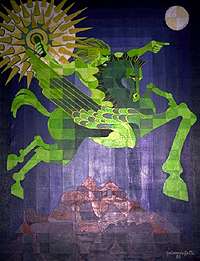Prince
Marko is known as King Marko in English, in Serbian
Краљевић
Марко (Kraljević Marko), in Macedonian:
Крале Марко (Krale
Marko), in Bulgarian Крали
Марко (Krali Marko).
Marko
(1335-1395) was a son of King Vukašin (Вукашин)
from the Serbian-originated Mrnjavčević dynasty (Serbian:Мрњавчевић),
who ruled what is geographically modern-day central Macedonia, his capital being
Prilep (See also Markovi Kuli). Sometimes, the Macedonians sources quote the
name “Mrnjavčevci (Мрњавчевци)”
for the dynasty. The dynasty originated from modern-day Herzegovina. After his
father died fighting against the Turks in 1371, Marko became a Turkish vassal,
who later died in the Battle of Karanovasa.
Marko
was turned into a hero celebrated by many songs in Serbian, Bulgarian and
Macedonian epic poetry. Folklore came to remember him as a respected protector
and savior of the local population during the Turkish yoke. It is unclear why he
became such an important figure of epic poetry taking into account his
relatively small historical role.
Marko
in Serbian epic
Songs attribute to Marko superhuman strength: he is said to be able to squeeze water from cornel dried for nine years; his weapon of choice is said to be a mace of 66 oka (85 kilograms); it is said that he chose a horse in the only one he could not throw over his shoulder. More importantly, the poems assert his knightly valor – even though he is prone to short-tempered outbursts, he remains a protector of the poor and the helpless, a guardian of the law and order, even when to his disadvantage. In one song thus he mourns killing a hero who was better than him; in another, he decides whom the rightful ruler of Serbian Empire even though his dishonesty could have benefited his own father. It is believed that he chose to die when guns were invented and when he saw that “every coward can kill a hero”, even from a distance. Even in death he only sleeps, waiting

Krali
Marko in a picture by
Davide Baffetto
in a cave until he is needed again, a typical king in the
mountain motif.
Marko’s
horse is named Šarac (Шарац, English Dappled).
His horse is depicted as a perfect match for the prince’s strength, so that he
drinks Marko’s wine too, a typical song begins with: “He drinks wine, oh
prince Marko;/half he drinks, half he gives to Šarac”. Marko’s chosen
woman-protector is a vila called Ravijojla (Равијојла).
His mother Jevrosima (Јевросима)
is historically unknown, although Marko and his brother Andrеja (Андреја,
sometimes known as Andrija) both exist in the historical chronicles of King Vukašin.
In Serbian epic poetry Mother Jevrosima she has become a symbol of justice,
moral, and the Christian worldview.
Marko
in Bulgarian and Macedonian epic
When
Krale (Krali) Marko was born, three narecnitsi (fate-fairies) appeared and
foretold that he will become a hero and replace his father, the king. When king
Vukašin heard this he threw his son on a basket in the river to get rid of him.
But a samodiva, called Vila or Samovila, found Marko and brought him up as his
foster mother. Because Marko suckled Samovila’s milk he acquired supernatural
powers and started fighting against the Turks. He had a winged horse, called
Sharkolia (meaning Dappled) and a stepsister - the Samovila Gyura.
When
reading the Bulgarian legends of Krali Marko, one finds important fragments of
pagan Slavic mythology and beliefs, even though Bulgarian folk epos was created
as late as 14-18th century.